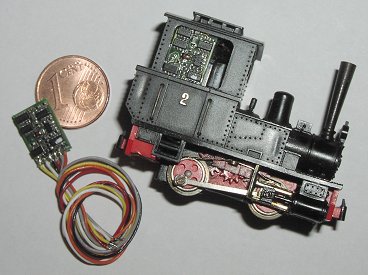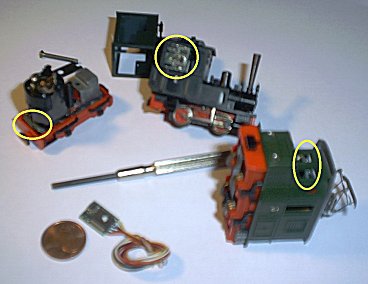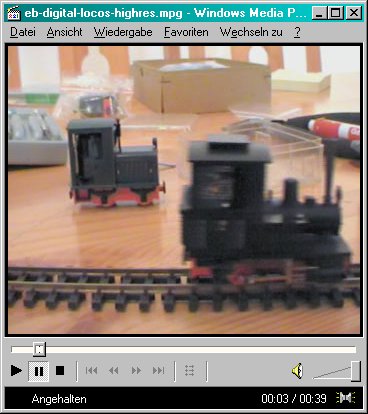Workshop II
The Workshop is a forum for EGGER-BAHN fans to present their modifications and further extensions. Nils Fuhrmann is going to commence with his -in fact sensational- digitisation of these tiny engines! But let him present his work by his own words:
»Already twenty years ago (I am now 36), I got in touch with the old EGGER-BAHN of my father for the first time. I simply integrated a simple oval within my current Märklin layout. But already at this time I was unsatisfied with the bad driving behaviour of these small engines. A few months ago I was watching digitised Z gauge vehicles at a friend's model railway and was immediately struck by their well balanced driving capabilities. The idea to digitise my father's EGGER-BAHN was born.«

»As a result of a few initial thoughts the following requirements were settled: First of all, all necessary modifications should be completely reversible. Second, all necessary investments should be as small as possible and my already existing Märklin digital equipment should be useable for the EGGER-BAHN. At a trade fair, I was happy to acquire an Uhlenbrock 73500 multi protocol loco decoder, comprising delays for acceleration and deceleration as well as a low speed shifting gear for first trial runs.
A first modification experiment could start: A small Diesel engine was the candidate of choice. After removal of the housing the decoder could be soldered between the wheel's pickup contacts and the motor (only two soldering points had to be disconnected). The decoder itself was fixed on the engine's base plate. First trial runs were immediately convincing! Even at very low crawling speed the engine was running without the need of further cleaning.«

»But where to place the decoder? After all modifications it should be invisible. The following configuration has proven to be a good choice: The engine has a small metal block in order to increase friction to the track - located directly behind the motor. This block can easily be removed and the space now available can be used for installing the decoder. The decoder itself should be isolated against the motor to prevent short cuts.
The steam engine however is offering less space. The only practicable option from my point of view is placing the decoder by one of the side windows (again the decoder should be isolated towards the motor). The electric engine is offering more space. Here the decoder can be mounted at the inner side of the roof, using double sticky tape. Only a very close visual inspection would reveal the presence of the decoder's printed circuit board through the engine's windows…«

Demo Video LowRes (3478 KB)
Demo Video HighRes (6757 KB)
»As seen in the video, the result of these modifications is a 100% success! All engines are demonstrating a soft start, can be operated at crawling slow speed and have nearly no problems with current pick up, even when using original EGGER-BAHN tracks.
How can this pronounced improvement of current pick be explained? Since the decoder is now feeding the motor (maximum speed may be programmed by the selected decoders), the rails are always delivering full digital voltage. Depending on the actual digital system this may be up to 18 Volts. Such a voltage is easily forgiving for small dirt spots on the tracks or the engine's pick up contacts. This would be much more critical at lower voltages between 0 Volts and 9 Volts.
Some miniature decoders tend to heat up during operation in EGGER-BAHN engines. This may be caused by the fact that these small decoders were originally designed for the use in 1:160 scale vehicles (N gauge). Here the operational voltage is lower as in H0 systems, possibly causing the beforehand mentioned overheating. In order to prevent these thermal overloads, it is sufficient to run the digital system with a transformer with 12 Volts through 13 Volts output. Personally, I am operating my central unit with an old Märklin transformer (train output set to 13 Volts). With that, hot decoders are no issue any more...
How much does it cost? Well, the decoders may be acquired at eBay for some EUR 30,- ($ 30.-) apiece, or you may order these units through your local model shop. In case you already own a digital system, no additional costs will arise.«
So far the words of Nils Fuhrmann, who will be pleased to answer all further questions personally!